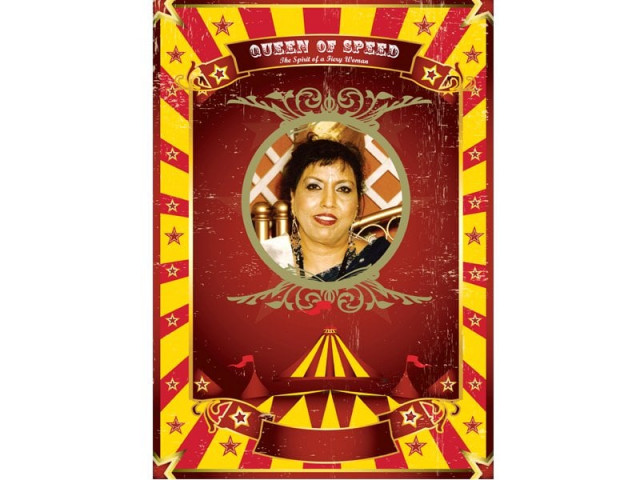Shahbana Qureshi: Queen of speed
Shahbana mastered biking and moved to treacherous and thrilling ‘Maut ka Kuaan’ which brought her unprecedented...

Shahbana mastered biking and moved to treacherous and thrilling ‘Maut ka Kuaan’ which brought her unprecedented fame.
In a society where most women make themselves comfortable on the backseat of motorcycles, crossing their legs decorously on one side and clutching on to the husband or brother driving the vehicle for support, Shahbana Qureshi is something of a wonder.
The ‘Queen of Speed’ (Raftaar ki Malka) spent 15 years of her life in the ‘Thrill Arena’, riding her black bike along the walls of the ‘Well of Death’ (Maut ka Kuaan), a gigantic barrel made from wooden boards.
As she raced her bike in dizzying, gravity-defying circles, round the Well of Death, the 20-year-old set hearts racing and pulses pounding, the roar of her motorcycle amplified by the roar of the astounded crowd. After all, how often had they seen a woman ride a motorbike, much less a female daredevil sport with this lethal act?
“People from all over Pakistan would come to see my performance,” says Shahbana, her grey eyes clouding with memories of times past. “I had die-hard fans who would come from distant places to see me.”
Born in Karachi in the 1950s, Shahbana was 17 when she started off in a dancing troupe in Aslam’s circus. With her physique and talent, she could have made a great dancer, but what really enthralled her was biking. She found a mentor in Maqsood Malik Golawala, whose act consisted of riding a motorbike in a round cage.
Despite a couple of knocks, Shahbana mastered the skill quickly and then moved on to her own act, the treacherous and thrilling ‘Maut ka Kuaan’ which brought her unprecedented fame.
At the height of her career in the 70s, hundreds of spectators would flock to see her riding her motorcycle blindfolded, not holding the handlebars. “I had an amazing black bike which had one big handlebar. It was very noisy,” she recalls.
Whizzing past the audience, she would pluck from their hands the handkerchiefs they held out for her, then speed to the Well of Death, where she spiraled upwards along its inner circumference, finely balanced.
Her long locks of hair would be braided up and twisted on either side of her head so that she could play the deadly sport without losing focus. Her loose shirt she would be tucked in her pants. She made a pretty spectacle, flying by on her motorbike, leaving the men in the audience stunned and gaping.
“I was so fit that even the dancing girls at the circus admired my beauty and figure and would ask me to join their act,” says Shahbana.
Her beauty was admired by more than just the dancing girls. She remembers one incident when, during her show, two fans got into a serious fight over her, drawing blades and injuring each other lethally. But it wasn’t just the men who were left dazed by Shahbana — women too would crowd the circus every Wednesday for the ‘Females only’ show to witness her talent.
Shahbana travelled throughout Pakistan with the circus — a dusty, colourful, shifting world, sometimes grimy, at others squalid, but always pulsing with energy. Though regarded as a free-wheeling place, Shahbana says that the circus where she performed had a mosque and she would help educate others about religion, even convincing a few people to adopt Islam. Her talent led her to work with some famous circuses including the Lucky Irani Circus and she even performed with television artists. “My fans gave me many souvenirs and I even got offers to join the media industry,” she recalls. “Those were the golden days of my life. But I never thought of the future — so much admiration at such a young age was all a teenage girl could dream of.”
The ability to take it one day at a time is what made Shabana so fearless in the arena, but it was this same capacity that has led to her living a simple, quiet life away from any hustle and bustle now.
Shahbana married Abdul Aziz, a businessman who fell in love with her after seeing her at the circus. A few years later, she left circus life behind her, settling down and taking care of her children. Now a housewife, it is easy to see her nostalgia for her former days, but she declares that she seldom regrets the decisions she made: “I am satisfied because I’ve had my heyday in which I dictated my terms and now I am content to live life the way it wants me to.”
Now she spends most of her time baby-sitting her grandchildren, amusing herself with their mischievous antics. Still, traces of her past are evident in her personality: her husband and three sons all say that Shahbana is as vivacious and fearless as ever. Of course, she doesn’t agree: “I used to be the most stubborn among all my siblings back in the day. But it’s the other way around now. My wonderful days are behind me — now I am no longer the ‘Malika’,” she says. “They would draw huge posters of every show and star. At the time I was too naive to maintain contacts or save souvenirs, and after my marriage it all faded into the past.”
She does have one gripe though: she is disgruntled at not being able to ride a bike anymore — not because she is too old, but because the motorbike has been stereotyped as a man’s vehicle in her city.
Published in The Express Tribune, Ms T, January 6th, 2013.
Like MsT on Facebook for your dose of girl talk.



















COMMENTS
Comments are moderated and generally will be posted if they are on-topic and not abusive.
For more information, please see our Comments FAQ